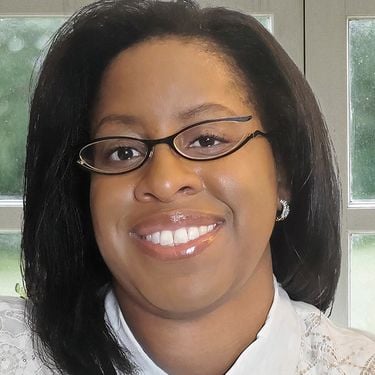From large corporations to small businesses, the approach to corporate philanthropy is continuously evolving. And in an era where corporate social responsibility holds increasing importance, businesses are called to demonstrate their commitment to some of today’s most critical issues from social justice challenges to environmental issues like sustainability and climate change.
That’s where Michelle Armstrong (M.Phil. ’08) is working to make an impact. “It’s important to understand how and why philanthropy can help drive systemic change and address existential challenges that carry global reach and impact,” explains Armstrong, Managing Director and Head of Philanthropy in the Ares Human Resources Department and one of the “most notable leaders in sustainability” in 2023 by Crain's New York Business.

Michelle Armstrong, Managing Director and Head of Philanthropy at Ares Management Corporation. (Photo courtesy of Armstrong.)
We sat down with Armstrong to learn more about her perspective.
You first started working in corporate philanthropy about 15 years ago. How has the role of philanthropy for companies changed since then?
Armstrong: Much has changed since I started working in corporate philanthropy. We’ve seen increasing attention to philanthropic outcomes, (i.e., the empirical and measurable changes in the knowledge, skills, behavior and condition of those served through philanthropy) rather than philanthropic outputs (i.e., quantifiable and tangible deliverables that result from philanthropy, e.g., number of hot meals served at a shelter).
Similarly, we’re also seeing an increase in understanding how and why philanthropy can help drive systemic change. More emphasis is being placed on the importance of helping organizations not only deliver programming and services, but also helping them increase their capacity to more effectively and efficiently execute their work
We’ve noticed a growing appreciation for how private markets can help effect social good through support in the form of fiscal (e.g., grants and contributions) and human (e.g., volunteers) capital.
What does it now mean for the people who work there and their clients?
Armstrong: An opportunity to make a difference in the community where they work as well as an expectation that their employer helps create those opportunities. Employees are motivated when their company offers them the chance to lead with purpose through, for example, workplace volunteer programs, and they expect executive leaders’ buy-in and support.
In the world of corporate philanthropy, what do you see as distinct about the Ares Charitable Foundation?
Armstrong: We strive to achieve distinction as evidenced by our attention to three key pillars:
- Intentionality: We advance “good” through the Ares Foundation as 501(c)(3) entity rather than through only corporate and employee contributions, and we strategically support three funding priorities that correspond with the primary business (career preparation and reskilling, entrepreneurship and personal finance) rather than opportunistically contribute on behalf of disparate causes.
- Evidence-based value: We measure immediate outcomes and long-term, aggregate impacts to inform our practice and the philanthropic sector. We also share quantitative and qualitative learnings with myriad audiences through various platforms to demonstrate thought leadership and thought partnership.
- Realized returns: We strive to amplify Ares’ impact as we create opportunities for – and deliver value to – the firm’s portfolio companies, industry colleagues and Ares professionals to give and get involved. We also help nonprofits attract additional support to maximize our financial support so that they scale up and sustain initiatives that we fund.
What’s your favorite part about what you do?
Armstrong: Blue-sky thinking with nonprofits around the globe about how we can jointly address social challenges in new ways that have yet to be tested. We want to help stand up bold solutions and build organizations’ capacity to strategically execute them.
With so much suffering in the world, people who often work to address these issues can often feel defeated. What keeps you going?
Armstrong: Understanding that change is not immediate but takes time. In addition, it requires multiple actors working in concert with one another. At the least, the Ares Foundation can help seed possible solutions that can be scaled and sustained over time, and we know that approaching the work with a patience-oriented mindset at the outset is critical to remaining motivated and encouraged.
